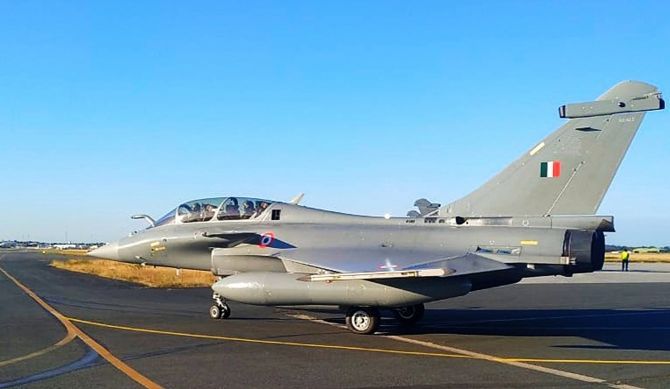Cevheri Güven
Turkey is on the brink of losing its military superiority over Greece in the Aegean Sea and airspace as Athens has struck a series of deals to boost its air force and navy amid Turkey’s tensions with the US. Within two years, Greece is projected to get the upper hand in the Aegean.
In September the Greek government announced an armed forces procurement budget of $2.5 billion for 2021, representing a fivefold increase compared to that of 2020.
Purchase of Rafale aircraft
Athens also recently announced its purchase of Rafale fighter aircraft from France at a cost of €2.3 billion. The agreement provides for the sale of 18 Dassault-made jets along with high-tech air-to-air missiles, with a delivery process scheduled to take off in mid-2021 and be completed within two years. Out of 18 aircraft, 12 will be second-hand Rafales from the French armed forces and six will be newly built jets to be delivered by Dassault.
Stelios Petsas, a spokesperson for the Greek government, said at a press briefing that the purchase of the Rafale aircraft would “shift the balances in the air,” without explicitly referring to Turkey.
Purchase of F-35s
Another major step taken by Greece to alter the balance in the air was its official bid to the US in November to purchase 24 F-35 fighter jets.
In late 2017 Turkey’s purchase of a Russian-made S-400 missile defense system had drawn reactions from the US and other NATO allies, ultimately resulting in Turkey’s removal from an international program to jointly manufacture the new generation F-35 joint strike fighters of which Turkey was projected to purchase 100 as part of the program. The US administration also halted the delivery of eight F-35s for which Turkey had already paid $1.25 billion.
Athens seized upon the rift between Turkey and the US over the F-35s and requested in November to place an order for 24 F-35s from the US.
Geoffrey R. Pyatt, the US ambassador to Greece, released a statement on Nov. 30 that the US had “welcomed Greece’s interest in acquiring the F-35 for the Hellenic Air Force.”
(https://twitter.com/USEmbassyAthens/status/1333383012835336199?s=20)
The Greek press has reported that the US administration responded positively to Greece.
Turkey may fail to modernize its F-16s
Last week the US administration announced sanctions against Turkey over the S-400 deal under the Countering America’s Adversaries Through Sanctions Act (CAATSA), which include a ban on all US export licenses and restrictions on military cooperation.
The sanctions will have a bearing on F-16 jets, the backbone of both the Turkish and Greek air forces. Greece has completed the integration of the Block50/52 Variant on its 114 F-16Cs, while the 158 F-16C in Turkey’s inventory has only been modernized to the Block 30/32 level.
CAATSA sanctions make it impossible for Turkey to modernize its F-16 fleet in the near future. There have been rumors that Turkey has been engaged in secret diplomatic efforts to carry out a modernization in Israel.
Fresh reinforcements for the Greek navy
The two countries’ rivalry is not limited to dogfights over the Aegean since they are also locked in a maritime disagreement over the delimitation of sovereign zones. The Turkish and Greek navies were at odds in recent years amid a migrant crisis that hit the Aegean as a route used for migrants in their efforts to reach Europe. The most significant naval tension came when the two neighbors sparred over hydrocarbon drilling in the eastern Mediterranean. On Aug. 12 the Turkish frigate Kemalreis and Greek frigate Limnos collided, causing damage to both warships.
In its efforts to step up its defense, Greece also moved to reinforce its naval forces and announced a tender for four new frigates. In addition, it plans to modernize four of its existing frigates and to acquire four naval helicopters as well as air-to-air missiles and torpedoes. The plans are part of a 10-year plan to improve the navy.
“We think the United States is going to have a very competitive product to offer there with our frigates, and the unique American proposal to co-produce three of those frigates here in Greece,” Ambassador Pyatt said in an online interview in October. As part of its bid in the Greek tender, the US is offering to build three of the frigates jointly on Greece’s Syros Island, where American company Onex operates shipyards.
The US and Greek naval forces had also conducted joint maneuvers in the eastern Mediterranean over the summer, which angered the Turkish government.
US military base in Greece
After the rift between the US and Turkey, an important sign of rapprochement between the US and Greece was the setting up of a US naval and air base near the Greek city of Alexandroupoli, which is located close to the country’s land border with Turkey. The base was inaugurated in July with an official ceremony during which Sikorsky helicopters and military equipment belonging to US 101st Airborne Division landed. In addition, it was announced that Greek helicopter pilots would be trained by US military personnel.
Another major plan for the Greek army is the recruitment of some 15,000 full-time professional soldiers over the next five years.
Current balance of power in the air
The current air force balance between Turkey and Greece is as follows:
Turkey has 207 fighter jets: 49 F-4Es and 158 F-16Cs.
Greece has 189 fighter jets: 34 F-4Es, 114 F-16Cs, 16 Mirage 2000EGs and 25 Mirage 2000-5/Mk IIs.


